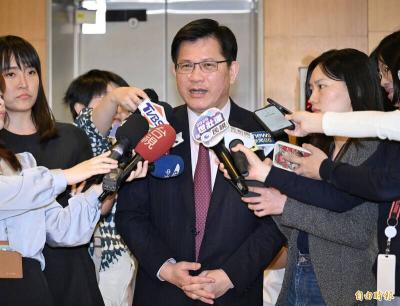Breast cancer and cervical cancer were the second and 14th-most common causes of death due to cancer in Taipei last year, the Taipei Department of Health said yesterday, urging female residents to undergo government-funded cancer screening tests regularly.
Breast cancer has the highest incidence rate among women who have cancer in Taiwan, with the 2017 national cancer registry report showing that 13,965 women were diagnosed with the disease that year, which translates to about 38 women per day, Formosa Cancer Foundation chief executive officer Lai Gi-ming (賴基銘) said.
“Getting a mammogram is effective for detecting precancerous breast lesions and cancer, and if breast cancer is diagnosed at an early stage [stage 1 or stage 2] and treated, the five-year survival rate can be as high as 90 percent,” he said.
A total of 110,650 residents received the free mammograms last year, up 10.86 percent from the year before, Taipei Department of Health Commissioner Huang Shier-chieg (黃世傑) said.
The city’s breast screening rate also increased from 38.18 percent in 2016 to 47.68 percent last year, he said, adding that 9,743 suspected cases and 650 confirmed cases were found through the tests and received treatment.
“The risk factors of breast cancer include early onset of periods, late menopause, not having children, having their first pregnancy over the age of 30, not breastfeeding and a family history of breast cancer,” Lai said.
“Lifestyle-related risk factors include smoking, drinking, an unhealthy diet and physical inactivity,” he said.
People with a family history of breast cancer should get a mammogram at least once every two years, he added.
In addition, 1,418 women were diagnosed with cervical cancer in 2017, which translates to about four women per day, he said.
As cervical cancer had taken the lives of many women in the past, increased awareness of the need to get Pap smear tests, coupled with medical advancements, has lowered its mortality rate to fewer than three per 100,000 people in recent years, he said, adding that most people found to have precancerous lesions or who are in the early stages of the cancer can be effectively treated.
“Early-stage cervical cancer usually has no symptoms and can be easily overlooked, so we urge people to get a Pap smear at least once every three years,” Lai said, adding that those whose tests showed abnormalities should get a follow-up exam as soon as possible.
To encourage more women to get mammograms and Pap tests regularly, the department and the foundation have collaborated to offer prize scratch cards to eligible female residents if they take the test between Aug. 1 and Nov. 30.
Women with a household registry in Taipei; are aged between 45 and 69 years, or aged between 40 and 44 and have a second-degree family member who had breast cancer; and have not received a mammogram last year or this year can join the lottery, they said.
Female residents aged 30 to 70 who are sexually active and have not received a Pap smear between 2018 and this year also qualify, they said.

Taiwan would welcome the return of Honduras as a diplomatic ally if its next president decides to make such a move, Minister of Foreign Affairs Lin Chia-lung (林佳龍) said yesterday. “Of course, we would welcome Honduras if they want to restore diplomatic ties with Taiwan after their elections,” Lin said at a meeting of the legislature’s Foreign Affairs and National Defense Committee, when asked to comment on statements made by two of the three Honduran presidential candidates during the presidential campaign in the Central American country. Taiwan is paying close attention to the region as a whole in the wake of a

President William Lai (賴清德) has appointed former vice president Chen Chien-jen (陳建仁) to attend the late Pope Francis’ funeral at the Vatican City on Saturday on his behalf, the Ministry of Foreign Affairs said today. The Holy See announced Francis’ funeral would take place on Saturday at 10am in St Peter’s Square. The ministry expressed condolences over Francis’ passing and said that Chen would represent Taiwan at the funeral and offer condolences in person. Taiwan and the Vatican have a long-standing and close diplomatic relationship, the ministry said. Both sides agreed to have Chen represent Taiwan at the funeral, given his Catholic identity and

Chinese Nationalist Party (KMT) Chairman Eric Chu (朱立倫), spokeswoman Yang Chih-yu (楊智伃) and Legislator Hsieh Lung-chieh (謝龍介) would be summoned by police for questioning for leading an illegal assembly on Thursday evening last week, Minister of the Interior Liu Shyh-fang (劉世芳) said today. The three KMT officials led an assembly outside the Taipei City Prosecutors’ Office, a restricted area where public assembly is not allowed, protesting the questioning of several KMT staff and searches of KMT headquarters and offices in a recall petition forgery case. Chu, Yang and Hsieh are all suspected of contravening the Assembly and Parade Act (集會遊行法) by holding

Taiwan would welcome the return of Honduras as a diplomatic ally if the next president of that country decides to make such a move, Minister of Foreign Affairs Lin Chia-lung (林佳龍) said today. “We would welcome Honduras if they want to restore diplomatic ties with Taiwan after their elections,” Lin said during a legislative hearing. At the same time, Taiwan is paying close attention to the Central American region as a whole, in the wake of a visit there earlier this year by US Secretary of State Marco Rubio, Lin said. Rubio visited Panama, El Salvador, Costa Rica and Guatemala, during which he